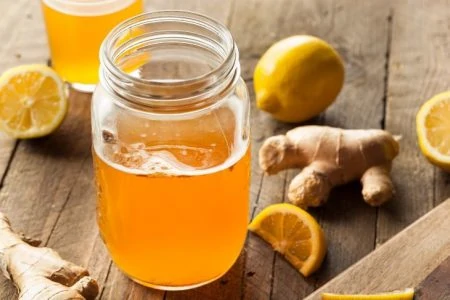Are you a huge kombucha fan but are wondering if it’s still safe to drink it now that you’re pregnant?
We’ve all heard of avoiding raw fish, alcohol, and soft cheeses during pregnancy, but what about kombucha? Is it harmful? Or, could it possibly even be beneficial?
In this article, we’ll talk about what kombucha is and discuss whether it is safe to consume kombucha during pregnancy and while breastfeeding.
Key Takeaways
- Kombucha is a probiotic-rich beverage made from fermented tea, sugar, and often fruit juices, but it may not be safe for pregnant or breastfeeding women.
- Concerns include caffeine content, trace amounts of alcohol, unpasteurization, and potential contamination risks.
- If choosing to consume kombucha, limit intake, avoid alcoholic versions, stay hydrated, and watch for side effects.
- Always consult your healthcare provider before trying new foods or drinks during pregnancy and breastfeeding.
What is Kombucha?
Kombucha is a probiotic-rich beverage fermented by bacteria and yeast and brewed with black or green tea and sugar. Fruit juices or other flavors are often added during the brewing process to make its tart taste a little more palatable.
While this potent drink may seem like a new health fad, it has been consumed for thousands of years in Asian cultures.
It has only become popular in the U.S. within the past decade.
But you can now find it while strolling the aisles of most health food stores, grocery stores, and even some gas stations!
However, kombucha is not something you should try for the first time when you are pregnant. Always talk to your health care provider before starting something new.
Is Kombucha Safe to Drink During Pregnancy or Breastfeeding?
While kombucha may offer some potential health benefits, there are four main points you should keep in mind before consuming it while pregnant or nursing.
- Kombucha contains caffeine: Because kombucha is brewed with black or green tea, it does contain some caffeine.
- Kombucha contains alcohol: Kombucha possesses a trace amount of alcohol, which is a natural byproduct of the fermentation process. Alcohol could potentially compromise your growing baby’s health (1).
- Kombucha is unpasteurized: Pasteurization is a method of heat processing beverages and food to kill harmful bacteria. The FDA recommends avoiding unpasteurized products during pregnancy.
- Kombucha could be contaminated: It is possible for kombucha to become contaminated with harmful pathogens, especially when brewed at home.
The Consensus
A Few Words of Caution
If you are going to drink kombucha while pregnant or breastfeeding, there are a few precautions you should take:
- Limit your intake: As little as four ounces of commercial kombucha can be safe and effective for pregnant and nursing moms. But drinking too much kombucha can cause dehydration, bloating, heartburn, and insomnia (2).
- Avoid alcoholic versions: The alcohol content in kombucha can vary widely, so be sure to check the label before you swig. If you get carded at checkout, you need to find a different brand. GT’s Enlightened is a good one to stick with when pregnant or nursing.
- Stay hydrated: Staying hydrated is critical when you’re pregnant or breastfeeding — especially if you drink kombucha. If you’re dehydrated, your body may release toxins, which can travel to your baby through your placenta or breastmilk. Mix a few ounces of kombucha with water to gain all the benefits along with extra hydration.
- Watch for side effects: You could be more sensitive to the ingredients now that you’re expecting, so be sure not to drink more than a few ounces of kombucha at a time. And while kombucha is great for boosting your energy and relieving constipation, this could pass on to your breastfeeding baby and cause loose stools and sleeping troubles (3).










